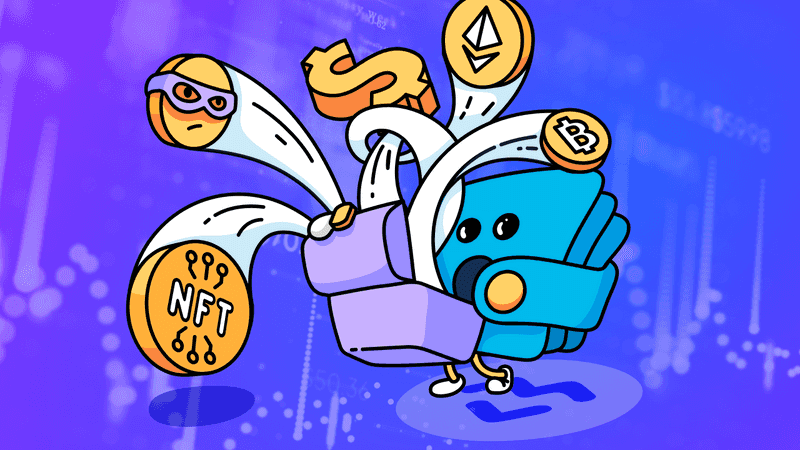Cryptocurrency is Pandora's box. Once you open it up, it might be impossible to close it.

This box is full of things: exciting things, scary things, roadblocks, pitfalls, and hopefully... rewards!
When you choose to open up that box, you need a lot of things to properly navigate; you need equipment, tools, contingencies, and the right mindset… because we want you to not only survive the world of cryptocurrency, but thrive as well.
Custody of the Keys
Custody is one of the most important things to understand when you’re getting into cryptocurrency. Custody is referring to who has primary control of your private keys (aka control of your funds).
In the traditional finance world, every bank would be known as “custodial” since they have access to and control of your funds. If you have cash in your pocket, you have custody of it.
In cryptocurrency, your crypto is managed in either a custodial or a non-custodial manner. There are services out there like Coinbase, Kraken, Binance, etc. - those are all custodial services because they’re holding onto your cryptocurrency, even though you have access to it. The opposite of this is a noncustodial service like MyCrypto or MetaMask. With MyCrypto, you’re assisted in accessing and interacting with your funds, but only you have control, not MyCrypto.

Choosing the method of custody for your cryptocurrency is up to you, and you may wish to utilize a combination, having a portion of your holdings in a custodial service and a portion in noncustodial.
Read these:
- You Should Want to Be Your Own Bank
- What’s the Difference Between an Exchange and MyCrypto?
- How to Stop the Next Quadriga: Make Exchanges Prove Their Reserves
Acquiring Cryptocurrency
After learning about the spectrum of custody, you’re ready to make your first move and obtain some cryptocurrency.
MoonPay
MoonPay is a solution that allows you to use your credit card to purchase cryptocurrency and send it directly to your noncustodial wallet. MoonPay (and every other service like them) requires your KYC (or know-your-customer) info once you’ve reached certain purchasing limits in order to avoid fraud. Also to note, not every cryptocurrency is available in every region.
- If you want to use a standard fiat onramp, use our MoonPay integration.
Centralized Exchange Onramps
Another popular type of fiat onramp is purchasing crypto directly through a centralized exchange. All major centralized exchanges offer onramp services in one way or another - through debit cards, credit cards, direct bank transfers, or all of the above.
This avenue also requires KYC plus involves the downside of not having your crypto go directly into a noncustodial wallet. You may be subject to additional delays in withdrawing.
- If you’d like to try purchasing cryptocurrency through a centralized exchange, try Coinbase.
LocalCryptos
A third option for obtaining crypto is via a peer-to-peer marketplace, like LocalCryptos. They’re decentralized and the exchange of fiat for crypto occurs from person to person, not from business to you.
Storage Solutions
Once you’ve got yourself some cryptocurrency, you need to make sure you don’t lose it.
If you obtained crypto through a centralized service, your cryptocurrency is being held by that centralized service. Generally, if you’re using a [reputable!] centralized exchange, your crypto isn’t actively at risk unless you do something that allows your account to be compromised.
How do you avoid getting your account compromised? Turn on 2FA (two-factor authentication) with an authenticator app (like Google Authenticator) or a hardware device (like a Yubikey).

This will make it so you can only access your crypto on that centralized service if you have the second factor of authentication with you personally.
Never use SMS / text messages for your second factor of authentication. Why? Because SIM swaps are a real thing and they are devastating.
If you purchased through an onramp that sends directly to your noncustodial wallet, your cryptocurrency is completely under your control and will be safe as long as you know how to store and manage it properly.
How do you store and manage your cryptocurrency properly?
1. Get a hardware wallet.
- If you have any amount of cryptocurrency that you wouldn’t want to lose, get yourself a hardware wallet.
- A hardware wallet stores your wallet’s secret key within the device so it never gets exposed when conducting transactions.
- Follow our hardware wallet recommendations.
2. Back up your keys.
- Back them up PROPERLY.
- Here’s how.
- Read this too.
- Also, test your recovery process to make sure you’ve backed things up correctly.
3. Read the rest of this article.
Fantastic NFTs and Where to Find Them
NFTs are like Pokémon. At first you have to search for them, but soon enough you’ll get a headache because everywhere you go and everywhere you look you’ll see a new NFT project.
This is a bit of an exaggeration, but it definitely feels true.
To find NFTs, you should start following people who talk about NFTs on Twitter. You can use MyCrypto’s NFTwitter list as a good starting point. Look at the projects they talk about, and if the project looks interesting to you, join that project’s Discord server. Suddenly you’ll be among others just like you!

Once you own an NFT or a few, you can view them on MyCrypto’s NFT Dashboard or use a marketplace such as OpenSea to trade them.
If you want to go even further, consider making your own NFT project! We can help with that.
Diving into DeFI
DeFi means Decentralized Finance, and after buying cryptocurrency it’s the next level - it’s doing something with that cryptocurrency. If you want to trade one token for another or deposit tokens in an effort to earn interest, you’d use a DeFi application to do this in a decentralized manner.
Centralized services also have DeFi-esque features, but don’t fit the exact “DeFi” definition. More like just “Fi.”
- Want to trade one token for another?
- Use MyCrypto’s Decentralized Exchange (DEX) integration.
- Want to earn fees by depositing your cryptocurrency into a liquidity pool?
- Use a decentralized platform like Uniswap.
- Want to borrow or lend cryptocurrency to gain fees?
- Use a decentralized platform like Compound.
There are a lot of things you can do in DeFi and the above is just the tip of the iceberg. Feel free to explore.
🚨🚨 SECURITY BREACH IMMINENT 🚨🚨
Something bad happened. You got:
- Scammed
- Rug-pulled
- Hacked
- Etc.
You’ve lost all your money, and all your NFTs. You worked hard for it and it is all gone in one fell swoop. That SUCKS. We’re sorry to hear it.
Hopefully you’re reading this and haven’t actually lost anything, but you’re looking into the future and seeing what might happen if you’re not careful.
Fear is a good motivator to kick your ass into gear and make sure you don’t screw yourself over and lose all your hard-earned funds.

The nature of cryptocurrency is decentralization which means you’re the one in control of your funds. But that also means you’re in charge of the security of those funds, and one mistake can mean losing EVERYTHING.
How do you avoid that?
- Be vigilant and aware of your surroundings, always.
- Be mindful when doing everything - making transactions, talking to people, visiting sites.
- Don’t let FOMO get the best of you - emotions make us do stupid things.
- You should generally NEVER need to type your secret recovery phrase unless you’re purposefully migrating accounts and backing up accounts. If any site or anyone asks you for anything private, it should raise a red flag.
- Don't share your screen with anyone and don’t use a remote desktop client to give someone access to your computer.
- Use a hardware wallet.
- Don’t trust links.
- Don't trust anyone that reaches out to you with anything, unless you already know them. And if you already know them, verify via multiple channels that it is in fact them.
- Don’t open files that people send you.
It seems that most people lose funds and learn these lessons the hard way. Do your best to avoid that.
Learn more about protecting yourself and your funds.
Landing on the Moon
“To the moon” is a phrase used often. But whenever someone says it, they mean something slightly different because everyone has a different definition of moon.
For some, reaching the moon might mean buying something nice.
For some, the moon might be paying off debt.
For some, the moon might be financial independence.
For some, the moon might be ETH @ $10K.
For some, the moon might be the fall of the traditional financial institutions.
Everyone has some sort of goal in their heads, and comparison is the thief of joy.
Find your own moon and keep it in your sights - because by being in this industry and reading this article, you’re already on your way there.
